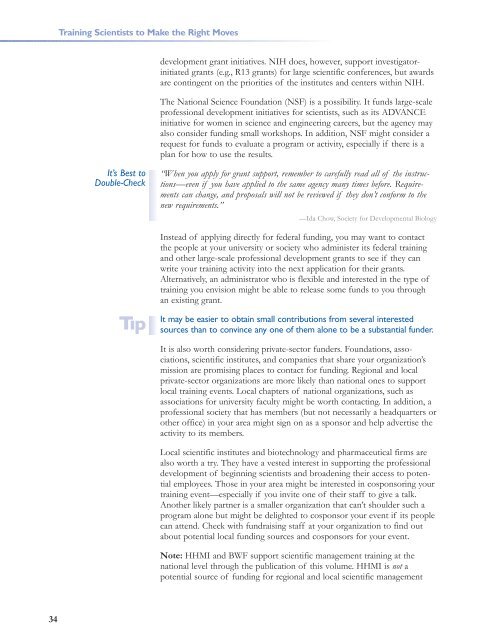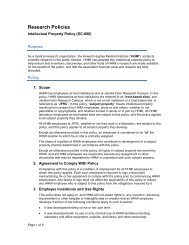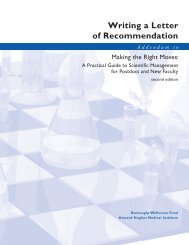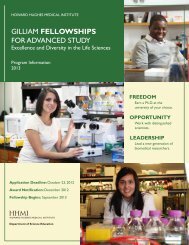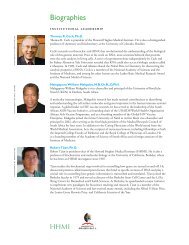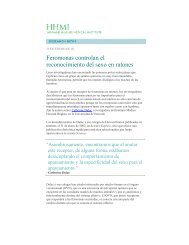Training Scientists to Make the Right Moves - Howard Hughes ...
Training Scientists to Make the Right Moves - Howard Hughes ...
Training Scientists to Make the Right Moves - Howard Hughes ...
You also want an ePaper? Increase the reach of your titles
YUMPU automatically turns print PDFs into web optimized ePapers that Google loves.
<strong>Training</strong> <strong>Scientists</strong> <strong>to</strong> <strong>Make</strong> <strong>the</strong> <strong>Right</strong> <strong>Moves</strong><br />
At a Glance<br />
“”<br />
QA<br />
It’s Best <strong>to</strong><br />
Double-Check<br />
development grant initiatives. NIH does, however, support investiga<strong>to</strong>rinitiated<br />
grants (e.g., R13 grants) for large scientific conferences, but awards<br />
are contingent on <strong>the</strong> priorities of <strong>the</strong> institutes and centers within NIH.<br />
The National Science Foundation (NSF) is a possibility. It funds large-scale<br />
professional development initiatives for scientists, such as its ADVANCE<br />
initiative for women in science and engineering careers, but <strong>the</strong> agency may<br />
also consider funding small workshops. In addition, NSF might consider a<br />
request for funds <strong>to</strong> evaluate a program or activity, especially if <strong>the</strong>re is a<br />
plan for how <strong>to</strong> use <strong>the</strong> results.<br />
“When you apply for grant support, remember <strong>to</strong> carefully read all of <strong>the</strong> instructions—even<br />
if you have applied <strong>to</strong> <strong>the</strong> same agency many times before. Requirements<br />
can change, and proposals will not be reviewed if <strong>the</strong>y don’t conform <strong>to</strong> <strong>the</strong><br />
new requirements.”<br />
Chapter One<br />
—Ida Chow, Society for Developmental Biology<br />
At a Glance<br />
Instead of applying directly for federal funding, you may want <strong>to</strong> contact<br />
<strong>the</strong> people at your university or society who administer its federal training<br />
and o<strong>the</strong>r large-scale professional development grants <strong>to</strong> see if <strong>the</strong>y can<br />
write your training activity in<strong>to</strong> <strong>the</strong> next application for <strong>the</strong>ir grants.<br />
Alternatively, an administra<strong>to</strong>r who is flexible and interested in <strong>the</strong> type of<br />
training you envision might be able <strong>to</strong> release some funds <strong>to</strong> you through<br />
an existing grant.<br />
It may be easier <strong>to</strong> obtain small contributions from several interested<br />
sources than <strong>to</strong> convince any one of <strong>the</strong>m alone <strong>to</strong> be a substantial funder.<br />
It is also worth considering private-sec<strong>to</strong>r funders. Foundations, associations,<br />
scientific institutes, and companies that share your organization’s<br />
mission are promising places <strong>to</strong> contact for funding. Regional and local<br />
private-sec<strong>to</strong>r organizations are more likely than national ones <strong>to</strong> support<br />
local training events. Local chapters of national organizations, such as<br />
associations for university faculty might be worth contacting. In addition, a<br />
professional society that has members (but not necessarily a headquarters or<br />
o<strong>the</strong>r office) in your area might sign on as a sponsor and help advertise <strong>the</strong><br />
activity <strong>to</strong> its members.<br />
Local scientific institutes and biotechnology and pharmaceutical firms are<br />
also worth a try. They have a vested interest in supporting <strong>the</strong> professional<br />
development of beginning scientists and broadening <strong>the</strong>ir access <strong>to</strong> potential<br />
employees. Those in your area might be interested in cosponsoring your<br />
training event—especially if you invite one of <strong>the</strong>ir staff <strong>to</strong> give a talk.<br />
Ano<strong>the</strong>r likely partner is a smaller organization that can’t shoulder such a<br />
program alone but might be delighted <strong>to</strong> cosponsor your event if its people<br />
can attend. Check with fundraising staff at your organization <strong>to</strong> find out<br />
about potential local funding sources and cosponsors for your event.<br />
Note: HHMI and BWF support scientific management training at <strong>the</strong><br />
national level through <strong>the</strong> publication of this volume. HHMI is not a<br />
potential source of funding for regional and local scientific management<br />
34


